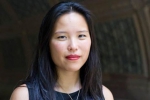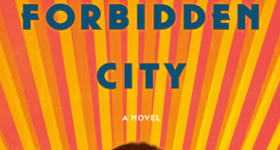There was a legend at my junior high that a girl named Nellie had died of a broken heart after her boyfriend had shown up to a dance with another date. Older girls whispered that her ghost could be heard crying in the girls’ bathroom, a pastel pink and yellow linoleum artifact of the ’70s, its stall doors hand-painted with life-sized girls in gingham patterned prairie dresses and large sunbonnets that obscured their faces. My braver friends would stand in front of the mirror and try to conjure Nellie by saying her name over and over again. So far as I knew, no one actually saw her, though many claimed to have heard her weeping. Skeptics claimed the noise was merely the groaning of the old radiator system. I wasn’t sure what to believe.
I never tried to conjure Nellie with the other girls; I had more personal ghosts to call upon. I would wait until I was alone and whisper my Korean name into the mirror: Se Rim, Se Rim, Se Rim. I would repeat it over and over again and study my face to see if it changed somehow, straining to see if, for a moment, I could glimpse the girl I could have been. Sometimes I glimpsed her in a flash — a girl my age, more graceful, more serene — but just like that, she would dissolve again into the mirror. I remember nothing about my past life, the one in which I was born and abandoned at a hospital in Seoul, but it seems to me more and more true that that past life is somehow still inscribed in me. Being abandoned early in life, I think, will always stick with me. My other self will always be trying to find her way back.
* * *
Early in her memoir The Magical Language of Others (Tin House Books, 2020), E.J. Koh writes that there is a Korean belief that one is “born the parent of the one you hurt most,” a line that first appeared in her poetry collection, A Lesser Love. For this reason, she says, “I was revenge when I was born in 1988 at O’Connor Hospital in San Jose, California. I was the reincarnation of somebody wronged, and no wonder I took a chunk out of my mother’s body.” I wondered, as I read that line initially in her poem, “Father in his Old Age,” and again when I read it in the memoir, whose trauma I carried in my body and whom I’d come back to haunt. How do we live with the losses indelibly marked on our lives?
Koh’s writing both documents the devastating effects of intergenerational trauma and constructs a vision of healing that addresses the wrongs of the past, forgives where necessary and then answers the past’s deep and unfulfilled yearning for love with caring for others — even strangers — in the present. For example, Koh spent years writing 1,000 love letters to strangers. Her parents had left her and her brother alone in California during her early teenage years to accept a lucrative job opportunity in Korea. They were supposed to have been gone for two years but ended up leaving them for seven years. Her mother wrote her letters, but Koh found it too painful to reply to them. It was only many years later that Koh was able to reread the letters and translate them. More astonishing than Koh’s recounting of how she survived her trauma, however, is the way she turns toward love as source of imaginative agency in the face of her remarkable loss.
While the poems in A Lesser Love led the reader through the fragmentary nature of intergenerational trauma, I read The Magical Language of Others not so much as an elegy but as a love letter — to both those who perpetuated and experienced those losses. Certain images and lines appear in both the poetry collection and the memoir. For this reason, it might be tempting to describe the memoir as a more fleshed-out version of the poems. My reading, however, is not that the poems sought to obscure anything; instead, they attempted to bear witness to the fragmentary nature of familial and historical loss that cannot be fully understood or documented. The memoir, in some ways, seems to pick up where the poems left off; in the face of that incompletion, the memoir seeks to respond to those losses and unknowns with love. The love that Koh envisions here is not the easy consolation of sentimentality. Rather, love as an intervening force demands much of those who seek to exercise it: attention, imagination and forgiveness. The love in The Magical Language of Others takes the form of the present self returning to haunt the past — not to punish or to frighten but to make amends, to forgive, to comfort the younger former self who struggled to make sense of her loss and longing.
* * *
After I graduated from college, I taught English in Gwangju, South Korea. It was a difficult year. I was overwhelmed by teaching for the first time and living in a country in which I looked as if I belonged but could barely speak the language. One of the first words I learned was ibyangin, adopted person. If someone gets frustrated by your speaking skills, a fellow adopted friend said, just say that word. And I did. When Korean people struggled to understand me, I’d repeat that word: ibyangin, ibyangin like an apologetic incantation. I watched as their confusion melted away, often into a forgiving sort of sadness. It felt somewhat like absolution, a forgiveness of all of the intervening factors that separated me from the language into which I was born.
I would take the train to Seoul on weekends, alone. I loved wandering the city, being one more anonymous face in the crowd. One night, I thought I glimpsed my birth mother on the subway in Seoul. She stepped into the train car at the Bell Pavilion stop. She was wearing a dark blue dress. Her face mirrored mine, similar around the eyes and lips, but 20 years older. As suddenly as we made eye contact, however, I looked away, shaken by the sudden shock of recognition. She disappeared into the crowd. Or perhaps it was I who disappeared. Ghost stories are seldom told from the perspective of the ghost. Who is haunting whom? Does my mother tell her friends that one night on a subway 12 years ago she saw the ghost of her daughter? Does some other version of me visit my birth mother in her dreams? Does she look at the faces in the subway for mine? Does she try to imagine what I might look like all these years later? When she looks at her face in the mirror, does she glimpse mine? Does she say my name?
* * *
Koh’s mother’s letters document the distance between her and her daughter’s lives, but they also provide gaps that allow for connection, even if Koh was unable to access that connection until many years later. Koh writes that at times her mother tried to translate certain Korean words for her, but she uses the wrong English definition. “Her error becomes a delight that cuts tension or stalls grief,” Koh writes. “Her language slips out of a perfect transcription and gives relief with obfuscation and humor.” She notes that she does not consider these translations as complete. “If [my mother’s] letters could go to sleep, my translations would be their dreams,” she writes. “The letters transport my mother to wherever I reside, so they may, in her place, become a constant dispensation of love.” Translations are connections, evoking and invoking the “other.” Translation, in this memoir, is a troubled and troubling space: one voice speaking out, another one answering or not. It is less a bridge between Korean and English as it is a sort of dreamlike connection made possible through the slippages and confusions of the two languages.
Naming, like translation, is a fraught affair in the memoir, a convention that evokes both connection and distance and cultivates a tension that Koh explores through the history of her own name. Koh mentions how her mother calls her Angela, her Catholic name, when she speaks formally, a name which is “proper for its foreignness — postured for the public.” In contrast, “Eun Ji,” Koh’s Korean name with its resonance with “softness and sensibility” is the name that Koh says belongs to her mother as it is the name her mother uses in intimate space, including her letters. In the memoir, names not only speak to the multivalence of interpersonal relationships but also to the complicated relationships between people and the political geographies through which their stories unfold.
Koh recalls how, as she was growing up, her paternal grandmother Kumiko’s connection to Japanese culture appeared only in traces: she went by her Korean surname Kang in public, spoke in Japanese only with the sushi counter ladies in the market and refused to teach her granddaughter Japanese. However, her grandmother does give Koh a Japanese name, “Fumiko.” The complexities and secrecy surrounding her grandmother’s names and the name she gives her granddaughter acts as sort of a shadow cast by the series of displacements her grandmother’s family experienced during Japan’s colonial rule of Korea. Kumiko’s family once lived on the Korean island of Jeju but moved to Japan after the country’s annexation and sought to become culturally Japanese in order to survive. After they fled back to Jeju due to political unrest and her father was killed in a protest, Kumiko married a Korean man and attempted to dissolve the vestiges of her Japanese identity out of fear of being killed as a defector. Later Koh discovers that she is ethnically part Japanese, which she assumes came from Kumiko’s side. She writes, “Maybe there was a violence we did not know about. Kumiko could have been a Japanese woman who became a Korean one.” So perhaps the Japanese girl who discovered she was Korean was Japanese after all. What first appeared to be erasure was actually partial obscuration.
By tracing the complexities of her own naming, Koh uncovers the ways in which naming can at once foreground and obscure different aspects of one’s identity. We carry the weight of our families’ history in our names as we do in our bodies — sometimes whether we know it or not. To reckon with ourselves, our pasts and each other, Koh seems to say, is to reckon with our names.
Toward the end of the memoir, Koh mentions that her poetry teacher asks if she can call her “Eun Ji.” No teacher before or after had called her that, Koh recalls. She responds, “You can say whatever you want — if you reckon with it.” By tracing the complexities of her own naming, Koh uncovers the ways in which naming can at once foreground and obscure different aspects of one’s identity. We carry the weight of our families’ history in our names as we do in our bodies — sometimes whether we know it or not. To reckon with ourselves, our pasts and each other, Koh seems to say, is to reckon with our names.
* * *
Someone once told me that my birth name was unusual and that my birth mother must have named me Se Rim so that she could find me again. I carried this story with me for years, imagining my name as a sort of cairn by the wayside of life, a marker my birth mother sent into the world to find her way back to me. After having struck up a casual friendship with Koh over poetry during a conference in San Francisco, I wrote to her and asked what she might know about naming practices in Korea. Was the story I was told and which I had clung to really true?
After asking her parents and her friends in Korea about my name, she reported to me that while it wasn’t exactly uncommon as the stranger told me, it didn’t sound like a city name, one that would be given to many baby girls in Seoul. I wondered why the stranger had given me the story about my name. Had she made it up entirely? Was it a tossed-off comment that she had thought nothing of? Perhaps the person understood that, having so little documentation of my past, I was desperate for something to hold onto and they felt compelled to give me a sense that someone might be out there, looking for me. That I was not forgotten.
My adoption documentation states that Se Rim means “tranquil, deep,” and I asked her if this meaning could be verified. She said it was difficult to tell because I didn’t have access to the hanja (of the Chinese characters) from which the name was derived. She said though, that the meaning I had been given was possible. In spite of her uncertainty about my name’s meaning, however, she wrote, “I can try to describe to you what a beautiful, thoughtful name you have and even to a sense, a name full of hope.”
How it felt to hear my name described in this way is difficult to articulate, but it felt as if it broke something in me. For so long, I had imagined that having the information about my past would somehow reconstitute me, bring me back to life. And yet, I knew that that would be impossible. That life is gone. Even if I am one day able to unlock all of its secrets and find my birth family intact, I will meet them as myself, as Leah, not as the Se Rim I could have been. Moreover, it’s impossible to know what that life would have been like, how its griefs and joys would have differed from those in the life I am making now. Still, I want to recognize that life for what it was and could have been — to grieve what was not — and to acknowledge the ways that grief has infiltrated my life. To hear my name in these terms, for Koh to translate the hope she heard in my name back to me felt akin to that brief flash of recognition in the mirror I experienced when I was a girl. Except this time, I was able to look at the girl, tell her that I grieved for her and what she could have been, but was able, at the same time, to let her go. To accept her loss as a part of me and, in a sense, lay her to rest, which is not to say that I forgot her, but that I would live in her memory — or perhaps, as her memory, as her dream.
There may never be explanations, complete stories, closure. I may never know who named me or why. I can love Se Rim for who she was and who she might have been. Through her memory, I can love the mother who I dream still loves her. My name will always be a beacon for myself, even if no one else sees her light.
Some adoptees find out years later that a nurse or a social worker actually named them instead of their birth parents. Some adoptees change their names back to the Korean names or incorporate some part of them into their English names, but that’s never felt quite right for me. Se Rim still feels precious to me in her own way. There may never be explanations, complete stories, closure. I may never know who named me or why. I can love Se Rim for who she was and who she might have been. Through her memory, I can love the mother who I dream still loves her. My name will always be a beacon for myself, even if no one else sees her light.
* * *
In Koh’s last semester at college, her academic advisor suggested that she take a poetry course. Koh recounts that her poetry teacher Joy (the one who she told could call her Eun Ji if she could reckon with it) “encouraged me to look closely, and poetry would teach me to pay attention and show me how to care. I must choose love over any other thing. Then, the world would open up for me.” In the end, the memoir demonstrates how language allows us to love by leading us through — and ultimately beyond it. Koh writes in an essay for Catapult: “Writing was not the thing. It was the thing that got me to the real thing — how I saw myself and my relationship to the world. Years ago, I had given up on books and decided to write a thousand love letters to strangers. I learned that I could live without writing, but I could not live without human connection.” Learning to name those experiences can also allow us to heal from them but only after we’ve been able to reckon with their impact on our lives. I for one, though, am glad that Koh hasn’t given up on books. Writing, as she says, may not be the “thing.” It provides a means to reckon with all of the ways language can trap and alienate us but also the ways in which it can teach us to love and set us free to find our way back to our histories, our family members both living and gone and to our many possible selves.










Comments